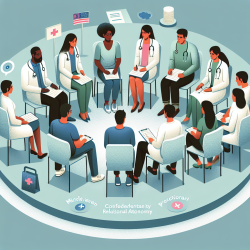Understanding Group Medical Visits (GMVs)
Group Medical Visits (GMVs) have emerged as an innovative approach to delivering primary healthcare, especially in rural communities. These visits involve a group of patients meeting with healthcare providers, offering a unique blend of medical care, health education, and peer support. However, GMVs also present challenges, particularly regarding patient confidentiality.
The Confidentiality Challenge
Confidentiality is a cornerstone of the patient-provider relationship. In GMVs, the traditional approach to confidentiality is tested as patients share personal health information in a group setting. This raises questions about how to maintain confidentiality while still fostering an open and supportive environment.
Research Insights: Strategies for Maintaining Confidentiality
According to the research article "Patient confidentiality within the context of group medical visits: is there cause for concern?" by S.T. Wong et al., several strategies can be employed to address confidentiality concerns in GMVs:
- Renegotiating Information Sharing: Providers should clearly communicate what information can be shared and what should remain confidential. This helps set boundaries and expectations for both patients and providers.
- Verbal Consent: Before sharing specific information, providers should seek verbal consent from patients. This practice reinforces the importance of confidentiality and empowers patients to control their information.
- Confidentiality Agreements: Patients can be asked to sign confidentiality agreements at the beginning of GMVs, which can serve as a reminder of the importance of keeping shared information private.
- Regular Reminders: Providers should regularly remind participants about confidentiality and encourage them to respect each other's privacy outside the GMV setting.
Benefits of GMVs Despite Confidentiality Concerns
Despite potential confidentiality issues, GMVs offer significant benefits. Patients report feeling empowered by the shared experience and gain valuable insights from both providers and peers. The group setting can enhance patient autonomy and foster a supportive community, particularly in rural areas where resources are limited.
Encouraging Further Research
While the study provides valuable insights, further research is needed to explore how confidentiality is perceived by patients who choose not to participate in GMVs and to understand confidentiality dynamics in urban settings. Practitioners are encouraged to delve deeper into these areas to enhance the effectiveness of GMVs.
Conclusion
GMVs present a promising model for delivering primary healthcare, especially in rural communities. By implementing strategies to maintain confidentiality, practitioners can create a safe and supportive environment for patients. This approach not only respects patient autonomy but also enhances the overall quality of care.
To read the original research paper, please follow this link: Patient confidentiality within the context of group medical visits: is there cause for concern?










